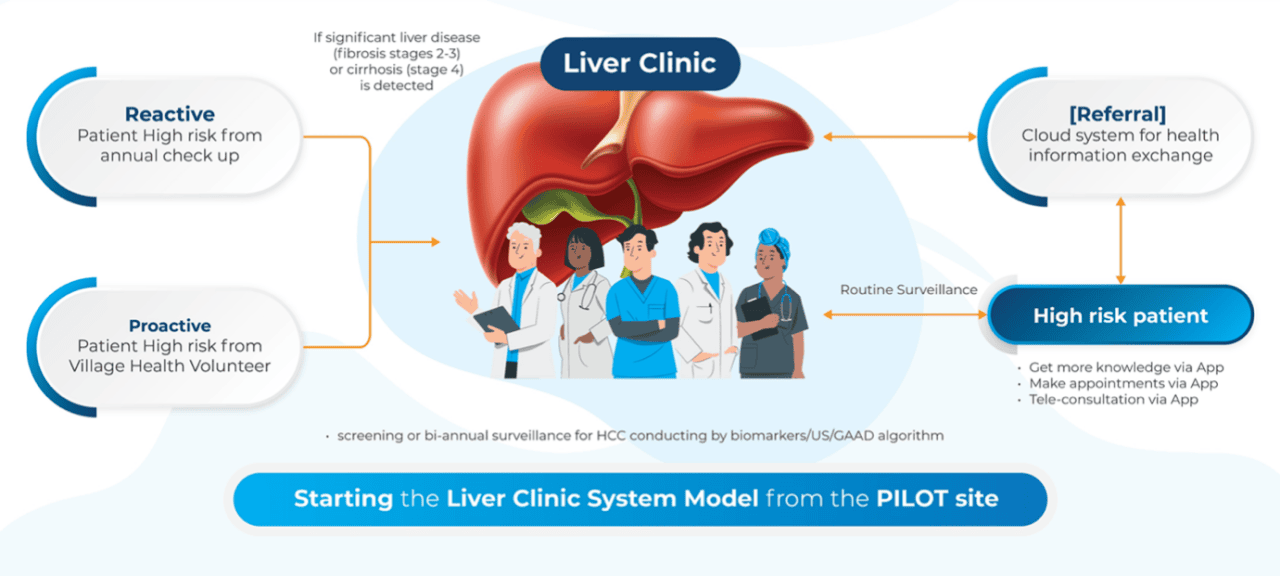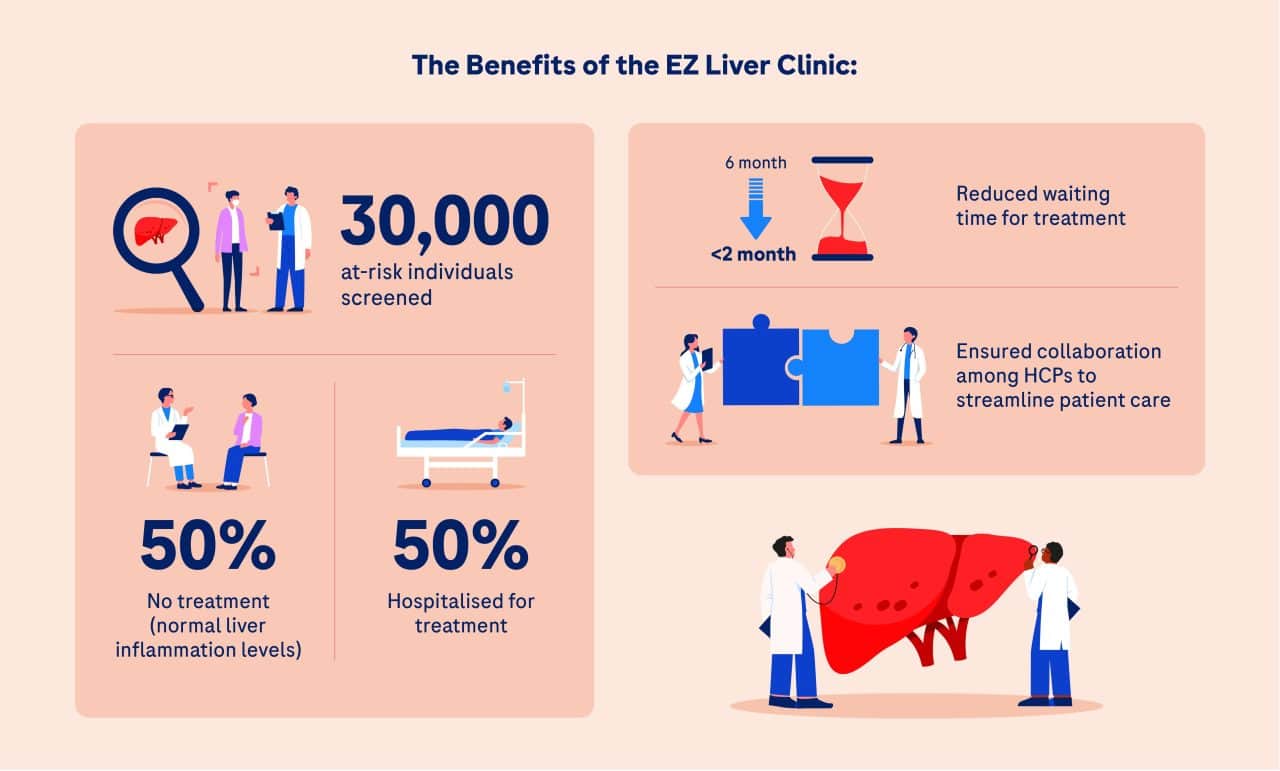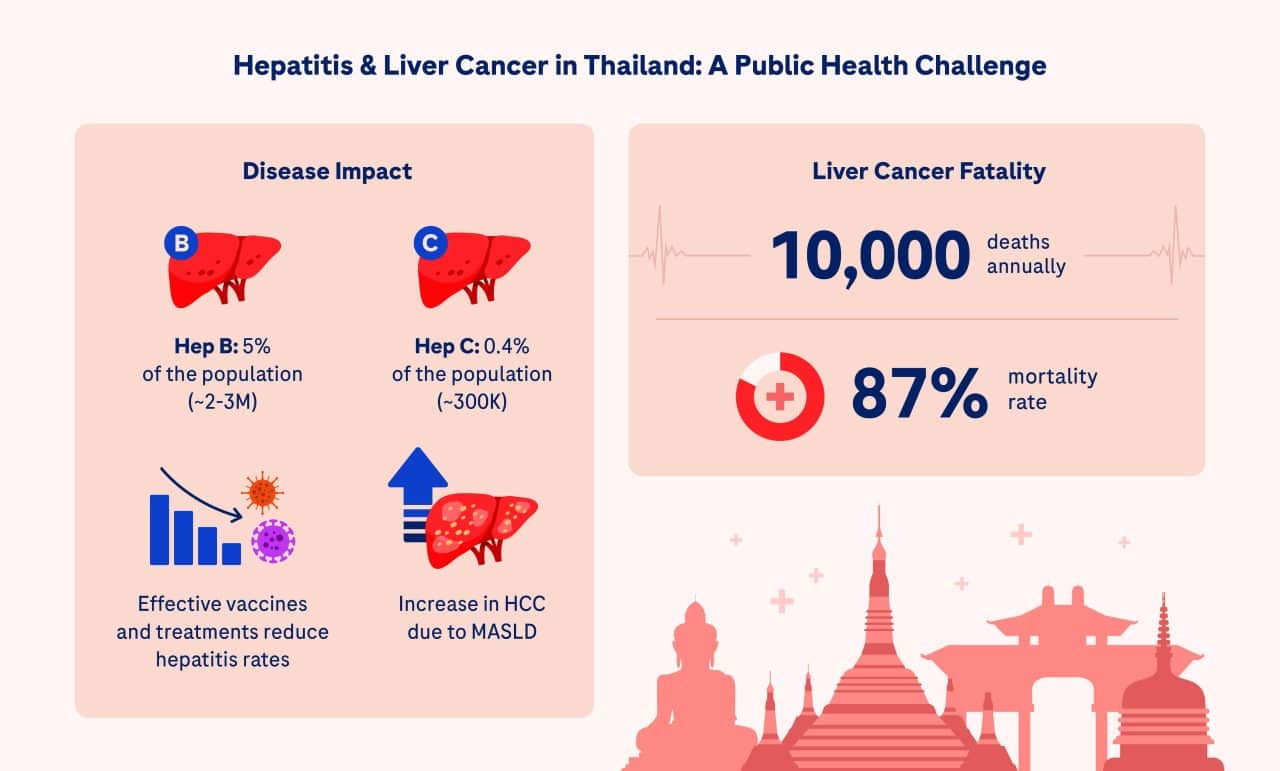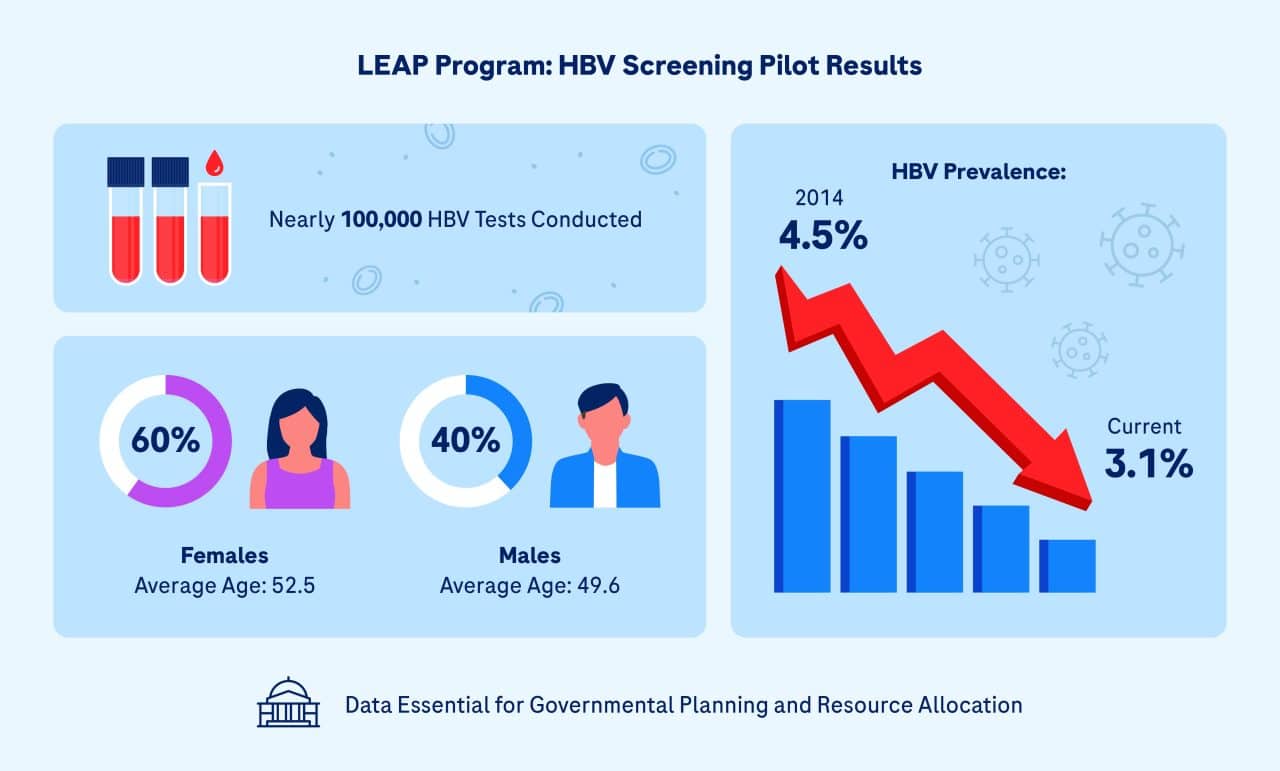Results of the Liver Ecosystem Advancement Project (LEAP) initiatives in Thailand
Listen to the podcast discussion with Dr. Passakorn Wanchaijiraboon on the EZ Liver Clinic
Introduction
Hepatitis B (HBV) and Hepatitis C (HCV) viruses significantly impact public health in Thailand, affecting about 5% (2-3 million people) and 0.4% (300,000 people) of the population, respectively. [1] Chronic HBV infections account for 49.8% [2] of hepatocellular carcinoma (HCC) cases.
Despite a decline in viral hepatitis due to effective vaccinations and treatments, HCC related to metabolic dysfunction–associated steatotic liver disease (MASLD) is on the rise.[3]
Liver cancer remains the leading cause of cancer-related deaths in Thailand, accounting for over 10,000 deaths annually as of 2008, with a mortality rate of 87% and a survival rate of only 13% post-diagnosis. It is the most common cancer among men and the third most common among women.[1] Challenges in treatment include a lack of healthcare staff and resources, particularly in rural areas, and insufficient nationwide epidemiological data for tracking infected patients.[3] Managing these diseases in a diverse and uneven healthcare landscape requires innovative approaches.
In response, integrated health initiatives such as the Liver Ecosystem Advancement Program (LEAP) were developed to bridge these gaps. They focus on improving the patient pathway, from screening and diagnosis to treatment and surveillance, using multi-disciplinary approaches and leveraging digital health platforms to enhance patient education and healthcare provider training. [1,3]
The LEAP Program: Bridging Gaps in Hepatitis Management
LEAP represents a strategic initiative to address the comprehensive needs of hepatitis management in the APAC region. In Thailand, it is a collaborative effort involving healthcare professionals (HCPs), experts, and policymakers from the National Health Security Office. It combines functions into a cohesive system that enhances the management and surveillance of hepatitis and its progression to HCC.
1. Efficacy of the HBV Screening Pilot
“The patient pathway should include screening for viral hepatitis (HBV, HCV) in the general population. Infected persons will then be linked to antiviral treatment and care by general practitioners and/or medical specialists. Subsequently, high-risk groups will require further tests for HCC surveillance, or referrals for HCC treatment if indicated,” says Prof. Pisit Tangkijvanich. [3]
One of the critical programs launched under LEAP was the nationwide HBV screening pilot. It evaluated people born before 1992, targeting a demographic that was largely unvaccinated and at higher risk for HBV. Approximately 100,000 Hepatitis B Rapid Test Kits (HBsAg strip tests) were distributed across 100 primary healthcare settings and district hospitals in more than 30 provinces across 5 regions. Under LEAP,10,000 fingertip blood tests for hepatitis B were provided at Sub-district Health Promoting Hospitals (SHPH) to benefit residents of other districts in Chanthaburi.[3]
The HBV screening pilot involved nearly 100,000 tests on a demographic of 40% males and 60% females, with average ages of 49.6 and 52.5, respectively. It found a 3.1% total HBV prevalence, down from 4.5% nationwide [4] in 2014, providing crucial data for governmental planning and resource allocation. [3]
Amplifying the Impact of HBV Screening with Digital Health Platforms and Education Campaigns
“Digital health platforms have the potential to increase awareness and knowledge, as well as facilitate HBV care that leads to the prevention and early detection of HCC,” continues Prof. Pisit Tangkijvanich. [5]
To boost the efforts of the HBV screening pilot, HBV-infected patients and healthcare professionals were engaged through various digital interventions. These included a self-administered questionnaire and e-learning modules to help patients better understand the disease and empower them to take charge of their liver health. Additionally, an online training program was developed for healthcare professionals to enhance their capacity in managing HBV.
Even in remote areas, significant public engagement was achieved through the World Hepatitis Day Campaign 2023, using videos, infographics, and texts across multiple digital platforms like Facebook, YouTube, and TikTok. This campaign alone garnered almost 9,000,000 views. [3]
2. The EZ Liver Clinic: A Comprehensive Care Model
The EZ Liver Clinic at the Phrapokklao Cancer Center of Excellence, the first in Thailand, represents a pioneering model in the integrated care for hepatitis and HCC, in the eastern provinces. Led by medical oncologist Dr. Passakorn Wanchaijiraboon, operator of the Chantaburi EZ liver network, this clinic was developed to address the region’s high prevalence of liver diseases by streamlining the process from screening to treatment.
It offered four key elements: proactive high-risk HCC group identification, digital health for HCC surveillance, new biomarkers for surveillance, and health information exchange. [1,5]
 The clinic focused on comprehensive liver function testing, ultrasound diagnostics within six weeks, and swift connection to treatment options such as microwave ablation or liver transplantation, if necessary.
The clinic focused on comprehensive liver function testing, ultrasound diagnostics within six weeks, and swift connection to treatment options such as microwave ablation or liver transplantation, if necessary.
The program’s success was evident as it:
- Revealed an HBV prevalence of 5.5% over three years in the Chanthaburi province.
- Reduced waiting time for treatment from 6 months to less than two months.
- Ensured collaboration among GI physicians, radiologists, interventionists, hepatobiliary surgeons, and medical oncologists to streamline patient care.
Over the past two years, 30,000 at-risk individuals were screened, identifying new Hep B patients; 50% required no treatment due to normal liver inflammation levels, while the other 50% were referred to Siriraj Hospital for treatment.[1]
 Early-stage liver cancer was detected in some, leading to referrals for potential curative surgeries or microwave ablation, supported by 2.5 million baht donations to purchase necessary equipment.
Early-stage liver cancer was detected in some, leading to referrals for potential curative surgeries or microwave ablation, supported by 2.5 million baht donations to purchase necessary equipment.
After the clinic’s success, the Ministry of Public Health (MoPH) announced the “Cancer Warrior” project to prevent, screen and provide effective treatment for various cancers, including liver cancer. The goal is to screen 1,000,000 at-risk individuals above 35 years old for HBV. [1]
EZ Liver Clinic Supporting Initiatives
As Dr. Passakorn Wanchaijiraboon emphasises, “Resolving breaks in the ecosystem cannot always be tackled by more resources, but we can look towards technology to connect the resources we do have.” [5]
Digital platforms for education and screening have expanded access and engagement, proving essential for the widespread dissemination of health information. Examples include:
- Health Link is a cloud platform under development intended to store and share patient health information digitally and connect community labs with referral hospitals to streamline the diagnostic and treatment processes.
- SurviLiver is an app with educational materials, a patient diary, an appointment booking system, and features allowing physicians to monitor their patient’s health between visits. [1]
These solutions are still undergoing development to allow the full integration of appointment scheduling and teleconsultation with the hospital systems. [1]
To further these initiatives, the partnership between the Ministry of Public Health (MoPH) and the Ministry of Digital Economy and Society (MDES) is necessary. While MDES handles the development of the Health Link project, it is the medical personnel from MoPH who are in charge of direct care for HCC and HBV patients.[5]
Future Directions for Scaling Up: Shaping reimbursement policies, education and partnership
Updating national guidelines to include the latest diagnostic tools and treatments would ensure advanced care is available uniformly across all regions.[3]
In Thailand, AFP testing costs approximately USD 8, and PIVKA-II costs about USD 10. Ultrasound is significantly more expensive at around USD 100 per session, with long waiting times. [5]
To advocate for improved surveillance strategies – such as blood-based biomarkers, compared to traditional methods like ultrasound – the HECON study evaluated the cost-effectiveness of HCC surveillance in Thailand.
The results showed that GAAD (Gender, Age, AFP, DCP/PIVKA-II) was cost-effective in Thailand at ICER <160,000 THB compared to no surveillance. GAAD also yielded lower costs and better health outcomes than US + AFP. [6] These data are invaluable in shaping local reimbursement policies to include blood-based biomarkers in HCC surveillance strategies.
Additionally, broadening insurance coverage for critical diagnostics and treatments is recommended to address gaps in hepatitis management and enhance access and affordability. Investing in Health Information Exchanges, patient management apps, and provider training would also streamline monitoring and data management.
As seen from the HBV Screening promotion efforts, educational campaigns can be effective in reaching even those in remote areas. Educational campaigns should be continued to boost hepatitis awareness and screening rates. [3]
Leveraging partnerships with the diagnostic and pharmaceutical industry can boost resource availability and technology transfer. This was exemplified by collaborations with Roche that catalysed efforts in the EZ Liver Clinic. [1] Collaboration and partnership are critical for these next steps, wherein HCPs, patients, government and industry partners will need to work closely with each other in order to effectively manage liver disease.
Conclusion
The LEAP program has enhanced patient pathways and healthcare access in Thailand through the synergy between the HBV Screening Pilot and the EZ Liver Clinic. By combining the strengths of both initiatives of wide-scale screening and education with an integrated care model, there has been a comprehensive enhancement in managing liver diseases from prevention to treatment.
Listen to our podcast episode with Dr Passakorn Wanchaijiraboon to find out more about the EZ Liver Clinic.
References:
- Wanchaijiraboon, P., M.D. 3 Jan 2024. Personal interview regarding roles at Phrapokklao Cancer Center of Excellence and the Chantaburi EZ liver network.
- Chonprasertsuk, Soonthorn, and Ratha Vilaichone. “Epidemiology and Treatment of Hepatocellular Carcinoma in Thailand.” Japanese Journal of Clinical Oncology, vol. 47, no. 4, 2017, pp. 294-297, https://doi.org/10.1093/jjco/hyw197. Accessed 4 Jun. 2024.
- Tangkijvanich, P., M.D. 2 Feb 2024. Personal interview regarding his role at the Center of Excellence in Hepatitis and Liver Cancer, Faculty of Medicine, Chulalongkorn University, and as the Immediate Past President of the Thai Association for the Study of the Liver (THASL).
- Posuwan, Nawarat, et al. “The Success of a Universal Hepatitis B Immunization Program As Part of Thailand’S EPI After 22 Years’ Implementation.” PLOS ONE, vol. 11, no. 3, 2016, p. e0150499, https://doi.org/10.1371/journal.pone.0150499. Accessed 4 Jun. 2024.
- Roche. (2023, May). Patient-centric and ecosystem insights into hepatocellular carcinoma across Asia-Pacific: Liver Ecosystem Advancement Program (LEAP)—expediting action to reduce incidence and mortality of hepatocellular carcinoma. Roche White Paper.
- Tangkijvanich, P. et al., (2024, March 29), Cost-Utility of Novel Biomarker-Based Strategies for Hepatocellular Carcinoma (HCC) Surveillance in Thailand [Poster presentation], 33rd Annual Meeting of the Asian Pacific Association for the Study of the Liver “APASL 2024 Kyoto – The Center of Hepatology”, Kyoto, Japan


